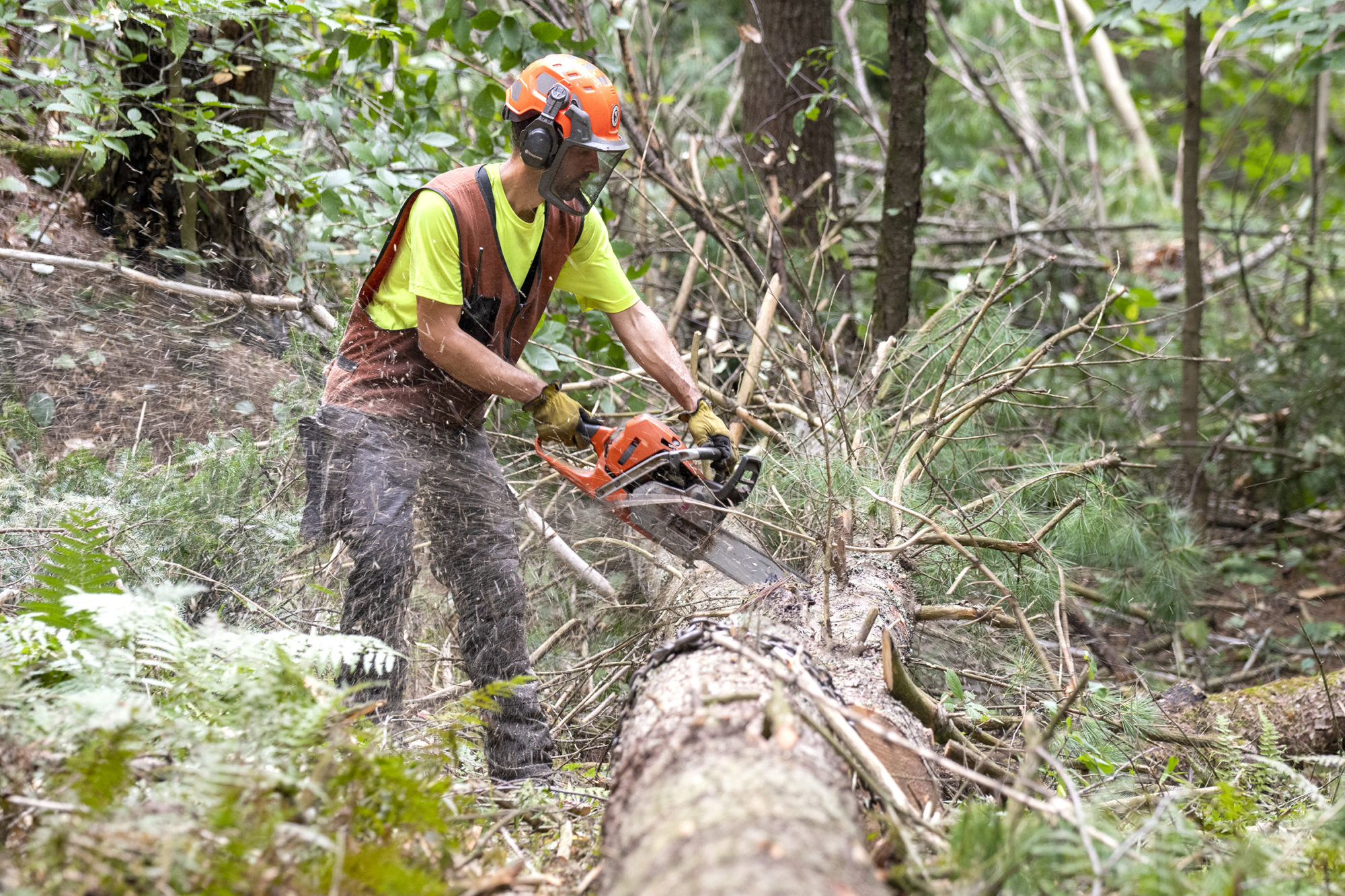Third Branch Horse Logging Finds Niche for Low-Impact, Sustainable Horse Logging in Vermont
October 27, 2021
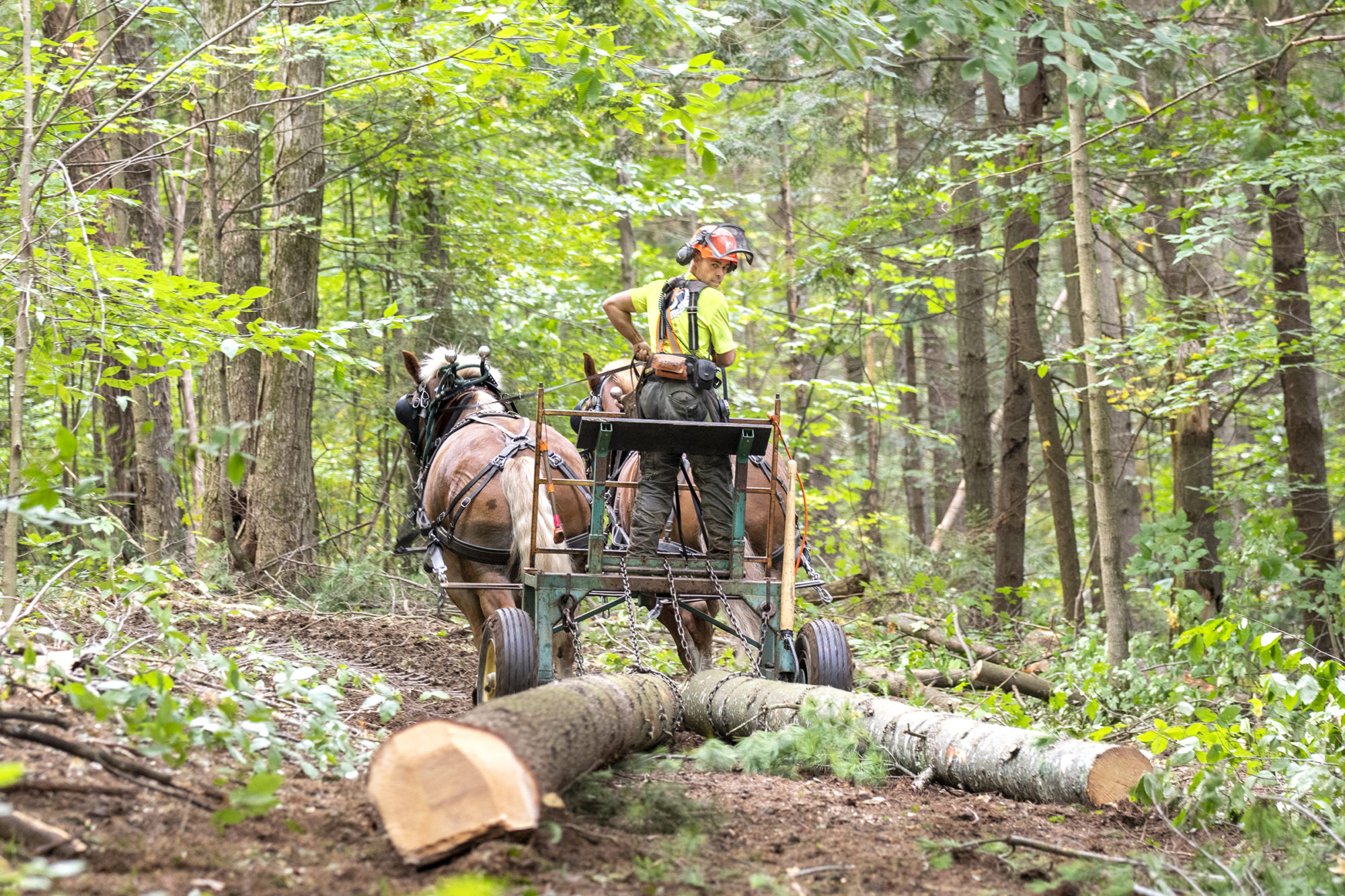
By Christine McGowan, Vermont Forest Industry Network
Brad Johnson would like to see wood products valued for the stand that’s left behind in the forest, not just the dollar value of the wood removed.
“The lumber industry is sort of where the food industry was in the seventies in terms of connecting the end product back to the land,” said Johnson, co-owner of Third Branch Horse Logging in Braintree, Vermont. “People are just beginning to understand that sustainability is not only about where your wood comes from, but also how it’s harvested.”
Johnson founded Third Branch horse logging with Derek O’Toole in 2018 with two core values. First, they both love working in the forest with horses and second, they believe there is a market in Vermont for low-impact logging that emphasizes forest ecology over speed or volume.
“The lumber that you cut is not the product,” says Johnson. “The stand you leave behind is the product. Our viewpoint on sustainability is not about a benefit to me in my lifetime, but rather how it will benefit my kids and grandkids. The land I’m harvesting today will be a beautiful lot, well-stocked with a variety of both mature and young trees that support wildlife habitat and provide carbon sequestration for generations.”
A teacher by profession, Johnson left his position at Maine Coast Semester in 2000 where he taught environmental studies. Ready for a change and yearning to work outdoors with his hands, he enrolled in a fall apprenticeship on a small horse-powered farm. “I didn’t know the front end of a horse from the back,” he said. “I was about as raw as I could be starting out.” But after just two weeks on the farm, Johnson knew he would never go back to working indoors.
“I was hooked,” he said. “I loved working with the horses all day and the work felt immediately meaningful.”
Johnson moved with his young family to Randolph, Vermont in 2008 where he purchased a single horse and a small tractor and began doing small, horse-powered logging and farming jobs. He joined a local CSA that was using horses for farming where he met his now business partner, Derek O’Toole.
At first O’Toole volunteered to help Johnson with logging jobs just to keep his team exercised in the winter months when the farm work was less demanding. “We worked well together and had complementary skill sets,” said Johnson, “and eventually it just made sense to bring our teams together and form a business.”
An evolving business model.
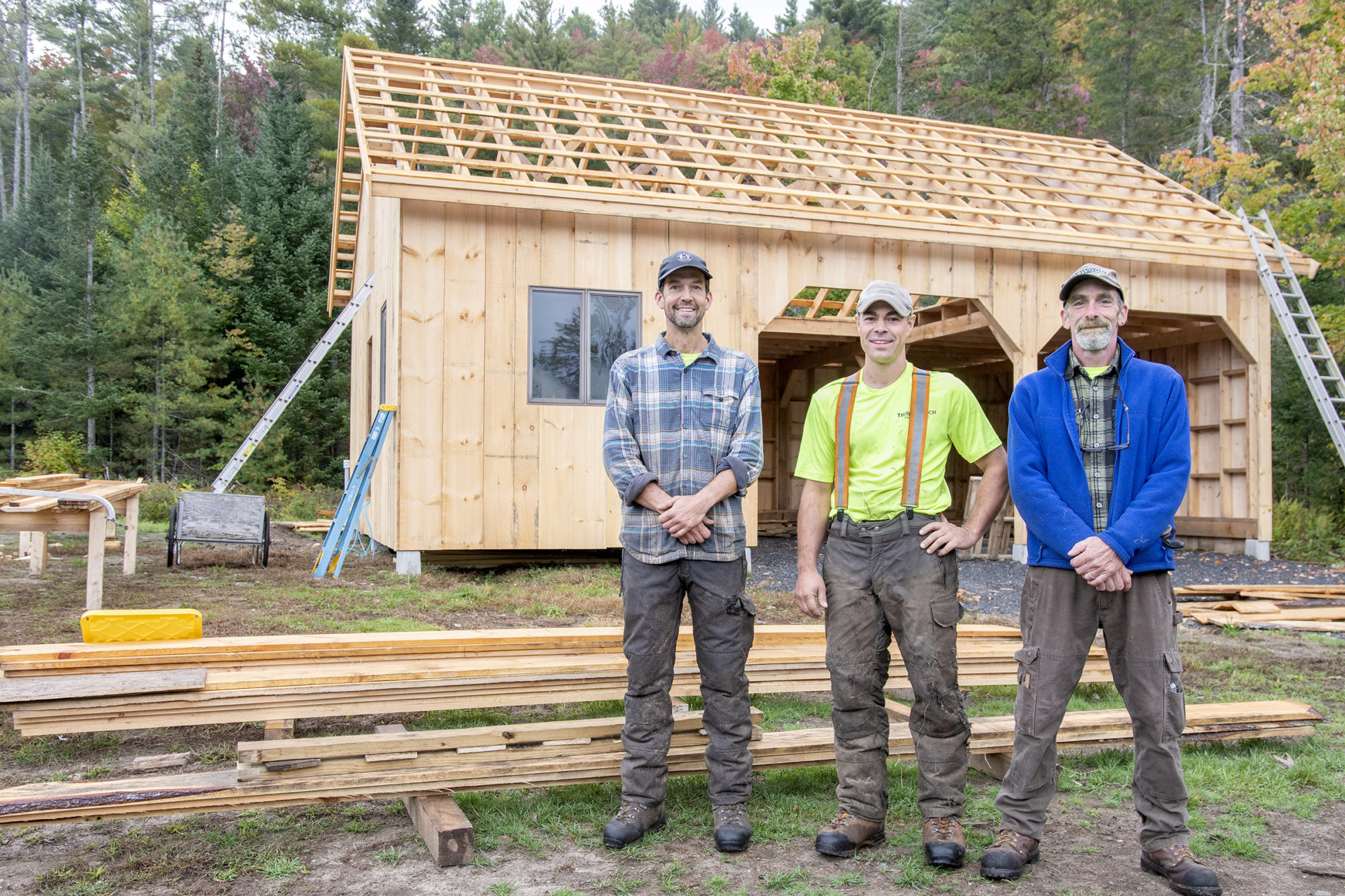
Partners Brad Johnson, Derek O’Toole, and John Plowden. Johnson and O’Toole recently brought on a third partner, Plowden, who rounds out the team with a background in cabinet making and milling, allowing them to offer on-site custom milling for customers. Photo by Erica Houskeeper.
Established in 2018, their first business model outlined 300 plus days a year of commercial logging work. They believe deeply in the benefit of working with horses in the forest and felt commercial logging jobs were where they could have the most impact. “I’ve been working in woods for 20 years,” said Johnson, “and I still haven’t seen any tool or technology that leaves a better, finer result in the forest than a horse for the kind of objectives I want to see.” Those objectives include low-impact logging that minimizes trailway acreage, carbon footprint, soil erosion, and soil compaction.
But operating a horse team proved challenging in the winter months. “You just can’t move snow with horses the same way you can with a bulldozer,” said Johnson, “and trailering a team up icy roads isn’t ideal either.”
The pair regrouped, evaluating where their horse teams would have the most value to landowners and landing on residential forestry jobs and horse powered logistical projects. In higher demand than the commercial jobs, their new business model focuses on services such as high-risk tree felling, residential view clearing, and winter sleigh rides. The steady revenue from those jobs allows them to pick and choose the very best opportunities for commercial harvesting with horses– about one per year. “We like to say our residential work supports our logging habit,” said Johnson.
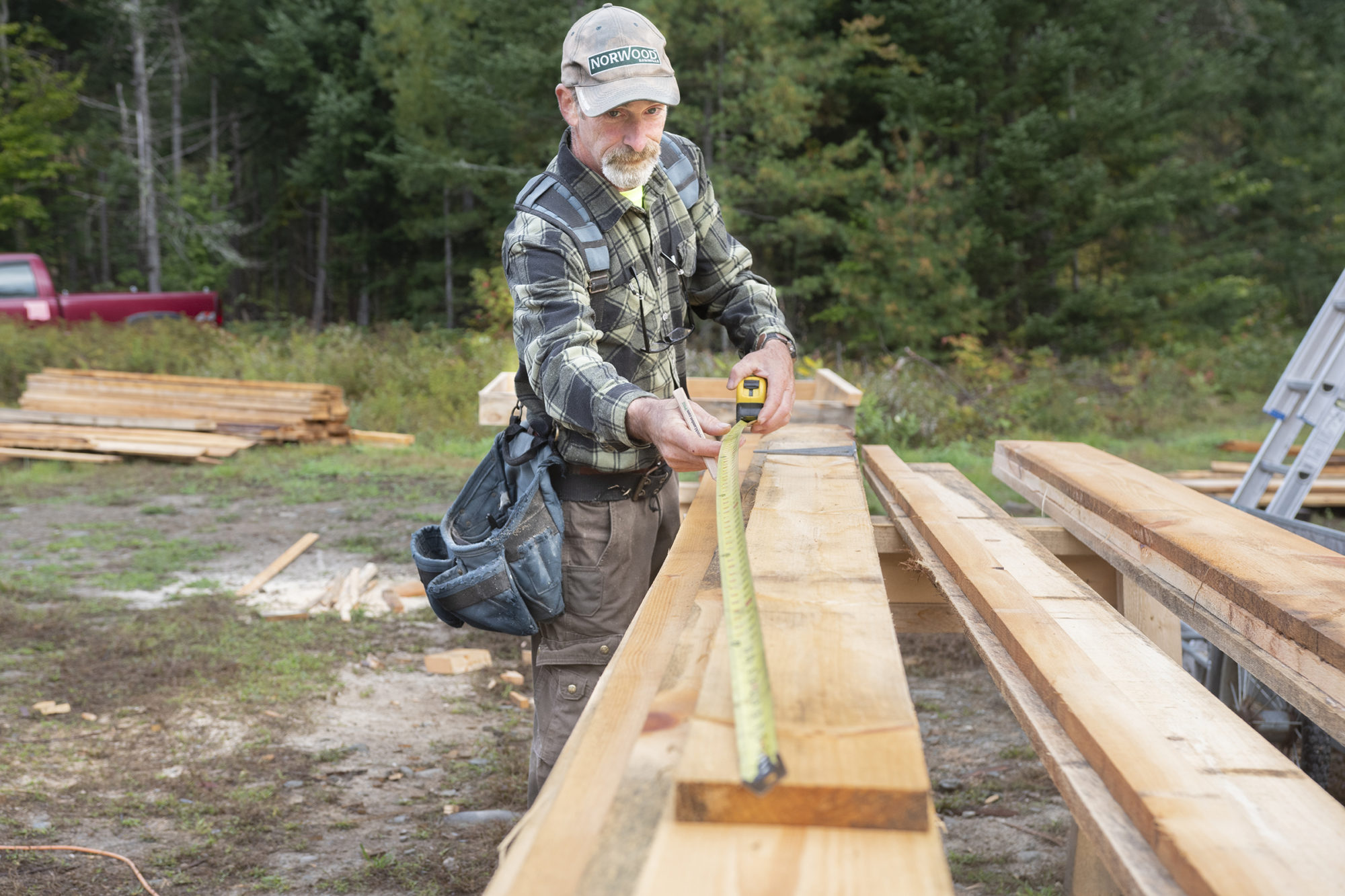
Business partner John Plowden constructs a pole barn, which is using timber that is milled on site. Photo by Erica Houskeeper.
Johnson and O’Toole recently brought on a third partner, John Plowden, who rounds out the team with a background in cabinet making and milling, allowing them to offer on-site custom milling for customers. “We’re in the Storming Norman phase,” said Johnson. “We’re working out how the pieces fit together and how we make money.”
The goal: make an impact and a living.
Even as they sort through the details and logistics of the business, they are crystal clear on their vision for the future—a logging business that values forest ecology over short term economic gains, working outside with the horses they love, and earning a livable wage.
“I’d love to be able to say that we’re getting paid well, doing the work we love, and having a positive economic and environmental impact. We’re not there yet, but I’m hopeful.”
Johnson uses his own property as an example of how he sees his vision coming together. He owns a 94-acre woodlot primarily composed of white pine. The main objective of his forest management plan is ecology, which encompasses broad goals such as carbon sequestration, wildlife habitat, preserving soil structure, and protecting water quality in the nearby Stoney Brook.
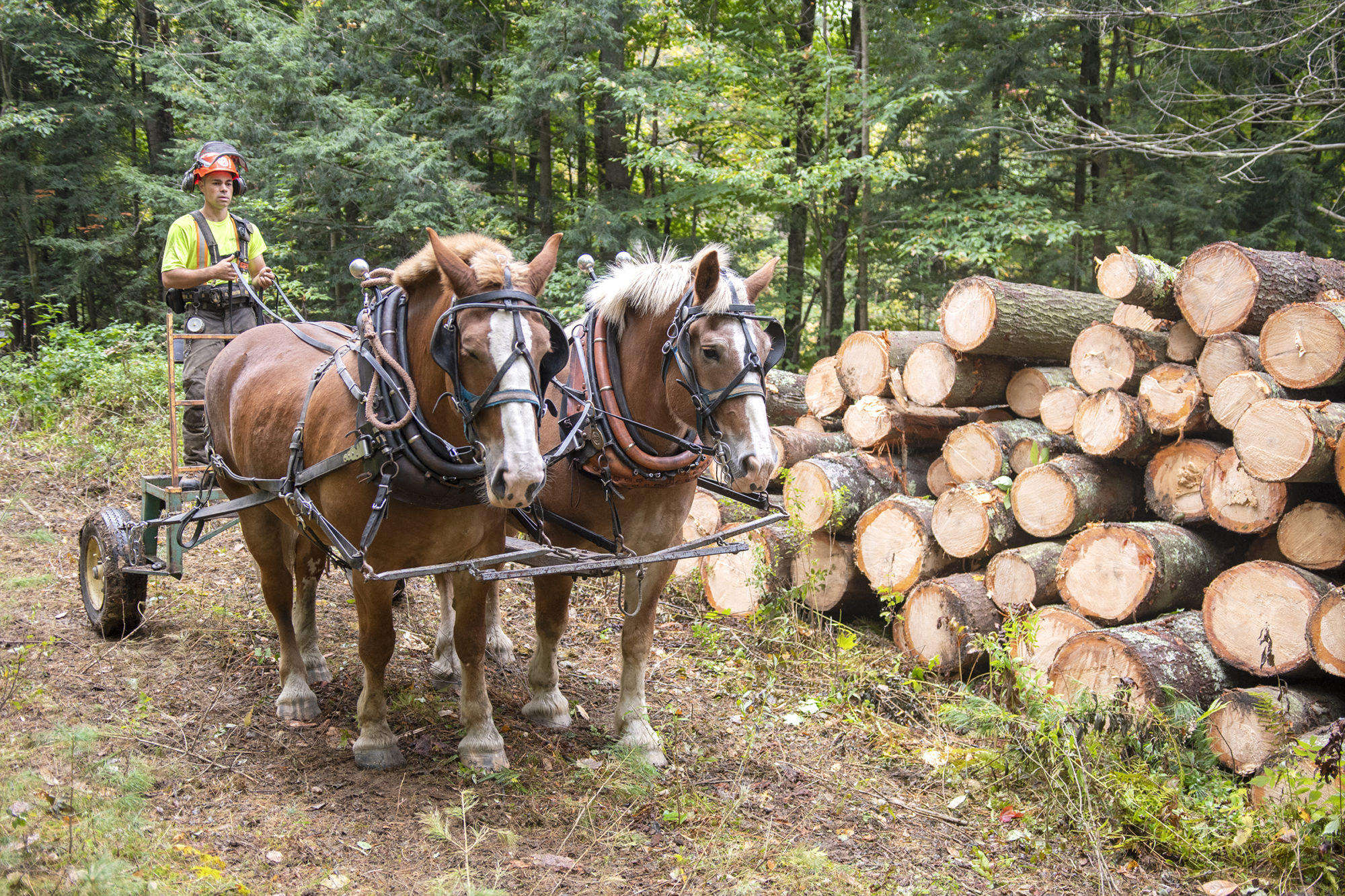
Derek O’Toole works at a site in Northfield with his horses. O’Toole and Johnson co-founded Third Branch Logging in 2018 because they believe there is a market in Vermont for low-impact logging that emphasizes forest ecology over speed or volume. Photo by Erica Houskeeper.
Second, he harvests timber to provide resources for his home and family, such as firewood for heat and lumber for their new pole barn, all of which is being milled on site. Johnson is aware of his own carbon footprint and believes local, sustainably harvested wood products are part of the solution to climate change. In addition to the fact that wood furniture and cabinetry trap and store carbon indefinitely, using locally harvested wood reduces transportation emissions and therefore the overall carbon footprint of the end product. And of course, using horses for the harvest instead of gas-powered equipment brings that footprint down even lower.
“Every stick of wood being used for the pole barn was harvested from our lot and milled on site,” said Johnson. “Not everyone is in position to do that, but it’s a model we can talk to our customers about.”
Lastly, Johnson hopes to earn enough through timber harvesting to pay for his taxes, though he is careful not to set a monetary goal for the harvest. “I try to think really holistically about the woodlot,” he said. “It’s not just a piggy bank you crack open with a hammer every 10 years and collect the change that falls out. It’s a living resource that with good management we can enjoy every year.”
Still a relatively young business, Johnson is tapping his teaching experience to help move their business model forward. He is passionate about ecology, climate change, and leaving the forests in better condition than he found them—as are his partners. But he realizes that traditional economic models of logging do not always support a slower-paced, lower-impact form of harvesting.
“It’s important that we think about big questions like long-term forest health and carbon sequestration, while simultaneously working toward a point where young people can make a living and support their families working in the woods,” said Johnson. “That starts with us thinking about woods in a different way.”
About the Vermont Forest Industry Network
Vermont’s forest products industry contributes $1.3 billion to Vermont’s economy and supports more than 9,000 direct and indirect jobs in forestry, logging, processing, specialty woodworking, construction and wood heating (2017). Those numbers more than double when maple production and forest-based recreation are factored in. The Vermont Forest Industry Network creates space for strong relationships and collaboration throughout the industry, including helping to promote new and existing markets for Vermont wood products. Learn more or join at www.vsjf.org.
Read More Stories Like This:
- COVID, Culverts, Climate Change and Vermont’s Future Forests
- Vermont Tree Wardens: A Voice for the Forest
- A Vermonter’s Approach to Sustainable, Affordable Housing
- Rugged Ridge Grows Sugarbush, Business in Pace with the Forest
- Combined Heat and Power at Allard Lumber Saves Money, Jobs, and Environment


